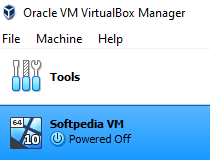
Screenshot:

Oracle VM VirtualBox is a general-purpose full virtualizer for hardware. Targeted at server, desktop and embedded use, Oracle VM VirtualBox is now the only professional-quality virtualization solution that is also Open Source Software.
Oracle VM VirtualBox is a package of strong x86 virtualization software for enterprise as well as home use.
NOTE:
The binaries from the download section are all released under the Oracle VM VirtualBox Personal Use and Evaluation License (PUEL).
Here are some key features of "Oracle VM VirtualBox":
· Modularity. Oracle VM VirtualBox has an extremely modular design with well-defined internal programming interfaces and a client/server design. This makes it easy to control it from several interfaces at once: for example, you can start a virtual machine in a typical virtual machine GUI and then control that machine from the command line, or possibly remotely. Oracle VM VirtualBox also comes with a full Software Development Kit: even though it is Open Source Software, you don't have to hack the source to write a new interface for Oracle VM VirtualBox.
· Virtual machine descriptions in XML. The configuration settings of virtual machines are stored entirely in XML and are independent of the local machines. Virtual machine definitions can therefore easily be ported to other computers.
· Guest Additions for Windows and Linux. Oracle VM VirtualBox has special software that can be installed inside Windows and Linux virtual machines to improve performance and make integration much more seamless. Among the features provided by these Guest Additions are mouse pointer integration and arbitrary screen solutions (e.g. by resizing the guest window).
· Virtual USB Controllers. Oracle VM VirtualBox implements a virtual USB controller and allows you to connect arbitrary USB devices to your virtual machines without having to install device specific drivers on the host.
· Remote Desktop Protocol. Unlike any other virtualization software, Oracle VM VirtualBox fully supports the standard Remote Desktop Protocol (RDP). A virtual machine can act as an RDP server, allowing you to "run" the virtual machine remotely on some thin client that merely displays the RDP data.
· USB over RDP. With this unique feature, a virtual machine that acts as an RDP server can still access arbitrary USB devices that are connected on the RDP client. This way, a powerful server machine can virtualize a lot of thin clients that merely need to display RDP data and have USB devices plugged in.
· Shared folders. Like many other virtualization solutions, for easy data exchange between hosts and guests, Oracle VM VirtualBox allows for declaring certain host directories as "shared folders", which can then be accessed from within virtual machines.
What's New in This Release:
· VMM: fixed 64-bit guests on AMD Fusion CPUs (bug #8824)
· VMM: fixed handling of the sysenter/sysexit machine instructions in 64-bit guests on Intel hosts
· GUI: added linked clone support
· GUI: fixed error check when changing the VM controller settings (4.1.0 regression; bug #9246)
· GUI: fixed the inclusion of additional information (license, vendor, ...) on OVF export
· GUI: when taking a snapshot from the VM selector, don't do a live snapshot
· GUI: fixed immediate crash during start on certain environments due to a library version conflict
· Guest control execution: implemented copying single files from guest to the host (directories and filters not supported yet)
· Guest control execution: limited to serve up to 5 guest processes at a time by default
· Main: return the correct RDP default port fixing settings warnings in the GUI if the remote display was enabled at runtime (bug #9368)
· VBoxSVC: made the path comparison OS independent when images are registered (bug #9303)
· V...








0 comments:
Post a Comment